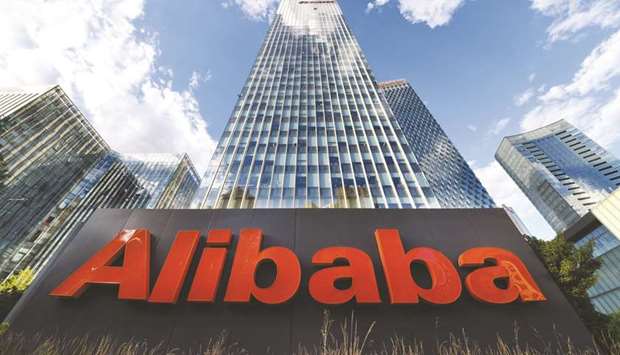Alibaba Group Holding Ltd raised about $11bn in a long-awaited Hong Kong stock sale, braving the worsening political unrest gripping the city and potentially gaining favour in Beijing.
China’s biggest e-commerce company said yesterday it has priced the shares at HK$176 each, a small discount to the last close of its American depositary shares in New York. The offering was covered multiple times and more shares were allocated to individual investors due to strong demand, according to people with knowledge of the matter.
Pulling off the sale in the midst of unprecedented civil unrest in Hong Kong is a coup for chief executive officer Daniel Zhang. It could swell Alibaba’s cash pile to about $44bn, more than any other internet company and roughly double that of arch-rival Tencent Holdings Ltd. And it’ll please local and Chinese officials trying to persuade the world that the troubled city still has a future as a financial hub.
“Alibaba is not really doing the sale because it needs the proceeds,” said Stephen Peepels, a partner at law firm Hogan Lovells who focuses on equity capital markets. “Alibaba is very cash rich. It’s doing the offering because it believes that having a Hong Kong listing is in its strategic interest.” One question now is how Alibaba, which in recent years made investments in areas from logistics to online television, will put the money to work. One area might be Southeast Asia’s e-commerce market, where Tencent-backed Shopee has been making inroads, according to Bloomberg Intelligence. Zhang could also use the capital to invest in new technologies like artificial intelligence or fast-expanding affiliates such as Ant Financial Services Group.
Alibaba has said it plans to use the offering proceeds to drive user engagement, improve operational efficiency and fund continued innovation, without providing specifics.
The offering caps a dramatic few days for Hong Kong’s stock market. The Hang Seng Index started the week strong, rallying on Monday and Tuesday partly on optimism about a US-China trade deal. A US Senate bill supporting Hong Kong protesters drew a sharp rebuke from Beijing yesterday, and equities gave up some gains.
All the while, unrest raged in a city that for months has been wracked by escalating violence between police and pro-democracy protesters. A police standoff with hundreds of demonstrators at a university in Kowloon and police firing hundreds of rounds of tear gas and rubber bullets, while those trapped in the campus rappelled from a bridge to escape arrest.
As protests snarled transport networks, bankers working to complete the Alibaba offering had to find workarounds. An investor luncheon - the traditional way of kicking off book-building for deals - was called off and replaced by phone meetings. Still, the deal drew orders from long-term buyers including China-focused funds and sovereign wealth funds, according to a message distributed to investors.
It’s a homecoming of sorts for Alibaba, whose decision to hold its $25bn initial public offering five years ago in New York dealt a blow to Hong Kong’s ambitions. Stung in part by the loss of Alibaba, the city last year reversed a longstanding policy of not allowing the dual-class share structures tech founders favour as a way of retaining control.
The efforts to lure Alibaba went all the way to the top of Hong Kong’s government, with chief executive Carrie Lam exhorting billionaire founder Jack Ma to consider a listing in the city. Ma had taken Alibaba’s business-to-business platform public in the financial hub in 2007 but took it private five years later - paying the same price it listed at.
China, locked in a trade war with the US, has been pushing companies like Alibaba to list on the mainland. Alibaba was one of the firms at one point expected to go public there using so-called Chinese depositary receipts, a regulatory project that later fizzled.
The threat that the US could limit China’s access to its capital markets likely added to the urgency to bring companies closer to home, said Brock Silvers, managing director of Adamas Asset Management.
“Alibaba simply isn’t a fit for China’s onshore exchanges, and Hong Kong was the company’s best option for compliance,” Silvers said.
“That Alibaba looks set for a smashingly successful listing may help draw other returnees, but those companies may not carry Alibaba’s appeal.”
While small compared with Alibaba’s $484bn market value, the listing is a notable win for Hong Kong. It will swell the value of stock offerings this year by almost a third to about $46bn - still short of the $55bn raised on the city’s exchange in the year-earlier period, data compiled by Bloomberg show.
More importantly, Alibaba’s sale could prompt the “next round” of China’s tech unicorns, like Didi Chuxing and ByteDance Inc, to opt for Hong Kong over the US when they go public, said Sumeet Singh, head of research at Aequitas Research in Singapore.
The share sale will help Alibaba finance a costly battle against homegrown rivals nipping at its heels. It could bankroll competition with Tencent and Baidu Inc in cloud computing and entertainment, with Meituan Dianping in food delivery and travel, and with all of them in terms of investing in promising startups that yield technology, talent or market share.

Alibaba Group Holding headquarters in Beijing. Alibaba raised about $11bn in a long-awaited Hong Kong stock sale, braving the worsening political unrest gripping the city and potentially gaining favour in Beijing.
